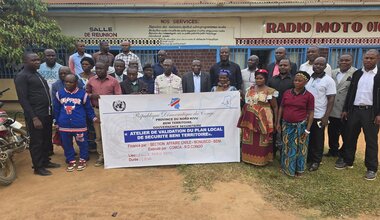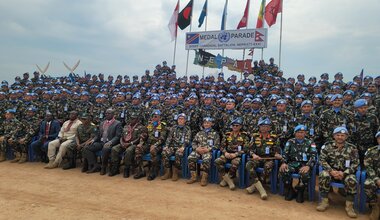An Interview of the MONUSCO Police Commissioner Abdallah Wafy with Radio Okapi in Kinshasa
Kinshasa, 26 October 2010 - MONUSCO Police is actively involved in providing much needed training to the Congolese National Police, in the framework of the Stabilization plan STAREC (stabilisation and reconstruction), explained the Commissioner, who also stressed that MONUSCO police will provide all possible support to PNC for the next General Elections in DRC. While mentioning the problems faced by PNC on ground, he reiterated the commitment of MONUSCO in terms of capacity building and equipment. Below is the main text of his interview.
Radio Okapi: Good morning Commissioner. Could you please tell us about the support being provided within the framework of the Government's Stabilization and Reconstruction Programme (STAREC) by MONUSCO Police?
Commissioner Wafy: As you know that within the framework of the STAREC programme, MONUSCO Police has received the mission to support deployment of the Congolese National Police (PNC) along the different priority axes identified in the east of the country. Essentially there are six priority axes in North Kivu, South Kivu and the Ituri districts. This programme involves establishment and construction of police offices and lodgings for police personnel so as to enable the deployment of both the Rapid Intervention Police (PIR) and the Territorial Police at various police stations. Today much of this infrastructure is already completed and some of the police personnel are now deployed in many of the designated areas. United Nations Police are supporting this deployment process by providing training and daily monitoring the operations of the PNC personnel deployed along the different priority axes including the Sake-Masisi, the Rutshuru-Maniema axes in North Kivu, the Fizi-Baraka, the Hombo-Minembwe axes in South Kivu, and the Bunia-Bogoro, the Geti-Boga axes in Ituri.
Okapi: And how many police officers must eventually be trained?
Commissioner Wafy: Within the framework of STAREC, we have short pre-deployment training courses to enable them to carry out their functions with maximum effectiveness on ground and to ensure restoration of State authority. But generally, our efforts to train the Congolese National Police include several types of training: long duration training courses like the one currently taking place at the instruction centre of Kapalata in Kisangani, Oriental Province; refresher programmes that are conducted at the Munigi instruction centre, about 12 kilometers from Goma in North Kivu; specialized training programmes, for instance, we have a training project for 500 police officers in Ituri as a part of the programme to combat sexual violence. We have many training projects for the PNC, some of which have already begun and some will follow in the weeks and months to come.
Okapi: The coming year will be an Elections year; will MONUSCO police assist in providing security for these elections?
Commissioner Wafy: Certainly. We are already in talks with the PNC's General Inspectorate and other partners with a view to providing refreshing courses for the Rapid Intervention Police unit. The General Inspectorate has already expressed its willingness to refresher courses for PIR elements, with a view to ensure security of the electoral process. You may recall that in 2006, UNPOL gave the PNC much support in ensuring security of the electoral process, and we also want to provide assistance to the PNC in that regard.
Okapi: A new service has been created to train inspectors tasked with controlling management of the PNC's human and financial resources with the support of MONUSCO . What support is MONUSCO providing in this regard?
Commissioner Wafy: We are very much involved at the level of the Follow-Up Committee on the Reforms of the Congolese Police (CSRP), which recommended creation of the body that you've mentioned – the General Audit Inspectorate – because, as you know, in order for a police force to conform to the standards and to abide by the law, there must be a body that is independent of the police and independent of the chain of command, and which is tasked to monitor and audit police management to ensure compliance with the standards. And in this regard, United Nations police has strongly supported creation of the General Audit Inspectorate. We have provided our assistance in drafting the terms of reference for this body but we are also involved in the training of police auditors who are deployed today and will be working within this body.
Okapi: What difficulties do you encounter in your collaboration with the PNC on ground?
Commissioner Wafy: I will not speak of difficulties. We do not have difficulties as such with the PNC. I am really delighted by the quality and excellence of the relations that we have with our PNC partners. However, I must admit that we do have many difficulties that relate to the very situation prevailing in the DRC today. Indeed, the Congolese National Police has enormous needs, notably in terms of training, logistics, construction of police stations, substations and equipment. For our part, we are mandated to support this police force which has huge needs in terms of capacity building and equipment. As you know that some training centers in the DRC are in poor condition and need to be rehabilitated if they have to play their due role. But it is also important to take into account the huge size of the Congolese territory as well as the fragile security situation yet prevailing in the east of the DRC, especially in the Kivus where we expect to train Congolese officers on ground at places like Jules Moké at Bukavu in South Kivu. This is because if trainees are to be transported from one province to the other, we will have to face enormous challenges and exorbitant costs. Those in brief are some of the challenges confronting us in the execution of our mission.
 UN
UN United Nations Peacekeeping
United Nations Peacekeeping






